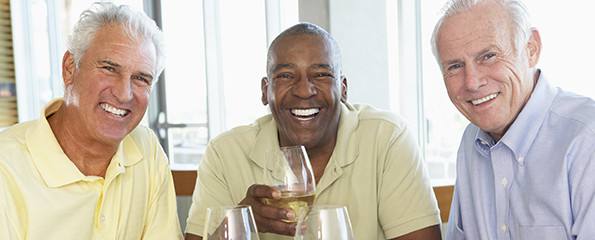Prostate cancer treatment side effects: Three guys find ways to cope and beat cancer
Prostate cancer therapies, like all anti-cancer treatments, come with side effects. And it’s not just the chemotherapy drugs or radiation, there’s also the side effects from hormonal therapies to prepare the male body for prostate cancer therapy.
While side effects of both hormonal and anti-cancer therapies can be quite severe, they effect all men differently. We spoke to Phil, Bob and Derek, three Australian guys who have experienced the side effects of prostate cancer therapy. As their experiences show, for some guys side effects are mild, but even when they’re more severe, it’s possible to manage the side effects and beat prostate cancer.
Being diagnosed with prostate cancer
Bob was diagnosed with two aggressive prostate tumours when he was 70 years old, although luckily the cancer had not spread from his prostate. His doctor recommended radiation therapy. Derek was in his late sixties when he received his diagnosis, and was thankful to know it had been diagnosed while the cancer was still contained in the prostate.
Phil had aggressive prostate cancer when he was diagnosed at just 52 years of age. In addition to hormone and radiotherapy, he was also prescribed chemotherapy. The treatment was successful and he went into remission but said that four years later, “I had a scan which revealed the cancer had returned and spread to two ribs and my right thigh bone. I recommenced hormone therapy and soon went into remission again, but within nine months or so my PSA [prostate specific antigen] levels started rising rapidly. I again recommenced hormone therapy until the levels dropped. This time however it was decided that I would continue with my therapy despite being in remission.”
Side effects of suppressing the male hormone testosterone
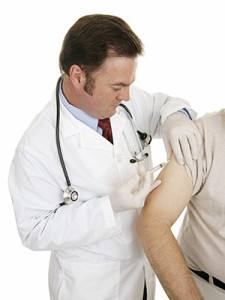 Phil, Bob and Derek all started their prostate cancer treatment with hormonal therapy to reduce their testosterone levels. “My doctor explained that before I could commence radiation therapy they had to reduce the size of my prostate which would be done with two lots of hormone therapy that starved the prostate of testosterone,” Derek said.
Phil, Bob and Derek all started their prostate cancer treatment with hormonal therapy to reduce their testosterone levels. “My doctor explained that before I could commence radiation therapy they had to reduce the size of my prostate which would be done with two lots of hormone therapy that starved the prostate of testosterone,” Derek said.
“Testosterone is fertiliser for prostate cancer, so I needed injections to reduce my testosterone levels before I could start radiotherapy,” said Bob. “I was given two injections of a testosterone-suppressant before I started radiotherapy. I had the first injection in August 2013 and the second in late November 2013. During this time my testosterone levels halved.”
Testosterone is the male hormone and plays an important role in developing the characteristics we associate with male bodies, things like body and facial hair and a deep voice. It also regulates men’s sex drive and sperm production. So reducing testosterone levels often causes changes in sex drive, body shape and male features.
Although Phil, Bob and Derek were given similar testosterone suppressing medications, they all experienced very different side effects.
Derek said he “experienced very few side effects other that the occasional hot flush or two and irregular sleep pattern. I think my difficulties with sleeping were mainly because I was waking up every couple of hours to use the toilet. I also have sleep apnoea and sleep with a CPAP machine so I went from seven straight hours of unbroken sleep to a broken sleep pattern.”
“At the suggestion of my doctor I tried a medicine which he thought might stop me needing to urinate in the night. It had no effect other than to increase the flow when I did urinate. My doctor also gave me a sample of another drug which had the effect of slowing the flow, but as there was no change in sleep patterns with either drug I stopped taking them,” he added.
“The hot flushes mostly occurred first thing after waking in the morning. They were similar to a rush of perspiration over my whole body. As they occurred after I woke up the discomfort went away very quickly. Although I have noticed that I still sometimes break out in perspiration after my first morning coffee.”
Phil, who now takes continual hormone therapy to ensure his prostate cancer doesn’t return, has experienced fatigue and reduced strength. However he believes his recent involvement in an exercise program, has helped him cope.
“I feel more alert and with it, than before I started exercising. Some of my strength and endurance has returned. I am less tired and can do more work in the garden, home and on my vehicles. I am now able to drive longer distances (Perth to Kalgoorlie) without the need for someone to take over driving so I can rest. That’s important to me because I have always been very strong and active, running four wheel drive expeditions to the remote deserts and doing all my own vehicle repairs and home handyman work.”
Bob experienced more severe side effects while using testosterone supressing therapy. “As hormone therapy has lots of side effects, I was also given tablets to combat the adverse effects but I still experience lots of changes that I could have done without,” Bob said.
“My sex drive was definitely lower, in fact it was almost non-existent. To quote a friend who has been through testosterone-lowering therapy, ‘Trying to have sex is like trying to play pool with a piece of rope.’”
Bob said knowing what to expect helped. “Thankfully this had been identified as a possible side effect before the treatment so I was expecting it and had time to talk to my partner Suzie about it. She experienced a similar problem with libido while she was being treated for breast cancer, so she could really understand what I was going through. We have a strong relationship, one that’s about more than just sex. There were still lots of ways we could express our intimacy for each other, kissing, holding hands and cuddling and we continued to enjoy that.”
“It was fatigue and lack of motivation which really impacted me. I have a fairly busy lifestyle and still operate two cafes, so I need to be fairly motivated. But procrastination became a way of life for six months or more. It was so frustrating, thinking of all the things that needed to be done but not having the energy or get up and go to tackle them.”
“I also started an exercise program which required me to exercise every morning. It was a bit of a double whammy. I was tired from getting up to go to the gym. I would usually work at the café until about 2pm then go home for a sleep in the afternoon. The staff took over so I could have that time off. But the few occasions when I had to work through the afternoon were really difficult to cope with. It helped that Suzie was really understanding. She knew it was what my body needed and would tell me to go home and sleep in the afternoon. So I didn’t feel guilty about it.”
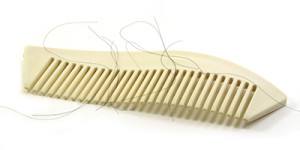 “The other side effects I experienced were loss of body hair, memory loss and low tolerance. Nowadays I’m usually pretty calm and can tolerate most people. Early in life had a short fuse and taught myself how to manage it so I’d developed the opposite, a very long fuse. I was pretty patient. With treatment that all changed. I was on a short fuse again, my temper would flare up momentarily, like when someone throws fuel on a fire. It wasn’t fair to the staff at the café or my partner. Thankfully she didn’t mess around with telling me that I had to teach myself to calm down and I was able to do that, consciously.”
“The other side effects I experienced were loss of body hair, memory loss and low tolerance. Nowadays I’m usually pretty calm and can tolerate most people. Early in life had a short fuse and taught myself how to manage it so I’d developed the opposite, a very long fuse. I was pretty patient. With treatment that all changed. I was on a short fuse again, my temper would flare up momentarily, like when someone throws fuel on a fire. It wasn’t fair to the staff at the café or my partner. Thankfully she didn’t mess around with telling me that I had to teach myself to calm down and I was able to do that, consciously.”
“I would forget silly things, like where the car was parked. Once I almost phoned the police thinking it had been stolen! Then I started writing things down, like the row I parked my car in. That’s something else I learned from Suzie. I still have memory problems but don’t think it’s treatment related, but more to do with age. Losing the car has stopped.”
Side effects of radiation therapy
When the hormone therapy came to an end each of the men started radiotherapy. While Bob experienced quite serious side effects from the hormone treatments, he said the side effects of radiotherapy, “Were less than I was expecting. I put this down to the technology used called IGRT (Image Guided Radio Therapy) which as I understand it focuses the radiotherapy onto a confined area, thus reducing the side effect impact.”
“It might also have been because I followed the instructions given to me to prepare myself before each day’s treatment. The main one was drinking 750ml of water, three quarters of an hour before treatment and holding on to it. Drinking the water was okay, but I was having difficulty keeping it in. If I needed to urinate that meant I had to delay treatment so I would drink more water.”
“I was very careful not to deviate from the instructions even though there were some days I wanted to. I feel this assisted and was part of the reason I experienced minimal side effects. Now that it’s all over I am pleased that I did as I was asked.”
“But I did still have some mild side effects, like slight incontinence, at least that’s what the doctors called it. I think it was more like a dripping tap! Thankfully it only affected me in the morning till about 11.00am and only for three months or so after the radiotherapy.”
“The only other side effect was a slight radiation burn which lasted for about 48 hours. It was on my thigh. The skin was tender but I treated it with skin cream and it went away. Importantly my overall wellbeing, emotional state and health were not impacted at all. If anything I felt better at the end of the treatment than at the beginning as the effects of the hormonal therapy were wearing off.”
The main side effect Derek experienced was fatigue. He said that despite the sleep disturbances caused by the hormonal therapy he, “was not tired during the day from this broken sleep pattern, but once I started radiation I became tired during the day. During this part of the treatment I would often take an afternoon nap.”
Side effects of chemotherapy
Phil had a more difficult time, coping with the side effects of both radiation and chemotherapy. “The treatments left me rather ill,” he said. “I was nauseated, my mouth felt like I had been eating aluminium foil, I vomited, I was very tired and had almost no energy, but the treatment was successful and I went into remission.”
“During the treatment I was unable to go four wheel driving or if I did go someone had to drive my vehicle because I often fell asleep. If I got a flat tyre on my four wheel drive, a regular occurrence when expedition driving, I was unable to change it.”
“I no longer carried out my own vehicle repairs or servicing. If my lawn needed mowing, despite having a self-propelled lawnmower, I would mow the front lawn one day and the back lawn the next. I relied on family to carry out handyman work at home. Overall I felt useless.”
Getting back to normal
Now that their hormonal and radiation therapy are over, Bob and Derek said everything is getting back to normal. “A check-up in early July 2014 showed my testosterone was back a normal level and this is reflected in my life and the way I’m feeling. I’m no longer feeling fatigued and I’ve got my motivation back,” Bob said.
“My body is also changing back to its old self, well almost. My body hair is growing back but my libido is still lower than it was. But at 72 years of age I am not getting too fussed about it. Much more important to me is that my tolerance level is much higher again and my memory has improved.”
Advice to other guys on coping with side effects
Although his side effects were relatively minor, Derek believes that prostate cancer treatment is something guys will find easier if they talk to other men who are going through or have been through prostate cancer. He also recommends exercise to reduce the side effects.
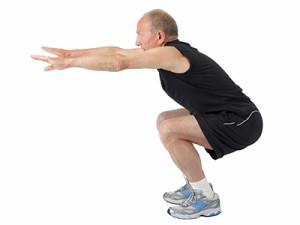 “As guys we tend individually not to share medical problems such as prostate cancer,” he said. “I know of some guys who have been diagnosed and treated for prostate cancer who have not even spoken to family members. For me sharing experiences with other guys meant I was better informed.
“As guys we tend individually not to share medical problems such as prostate cancer,” he said. “I know of some guys who have been diagnosed and treated for prostate cancer who have not even spoken to family members. For me sharing experiences with other guys meant I was better informed.
“I was thankful to be part of a structured exercise program run by a university, for men with prostate cancer. I believe that the exercise program helped substantially to negate many of the side effects of the hormone treatment, and also helped to offset the effects of radiation. I would definitely recommend this for others. At the very least if a guy cannot join an exercise program he should be part of a support group where he can meet other guys with similar problems.”
Bob agrees that getting information about side effects is important. “Understand what side effects you may get as early as possible in treatment and accept that you’re not the only one. My oncologist told me about the side effects at the first appointment and I had no issues with this. It reassured me.”
“I’ve had some side effects that other guys didn’t get, some we’ve had mutually, others I didn’t get. We’ve all had some side effects and each of us is slightly different. Accept that you will experience some side effects and you might have to make some changes because of that. Don’t try to be macho and continue like everything is the same. Make the changes you need to. And remember that prostate cancer treatment and its side effects are short term.”
More information
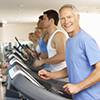 | Read more about Phil, Bob and Derek and their experience exercising during their prostate cancer treatment as part of a supportive, social research group, in Exercising for better health in prostate cancer therapy. |
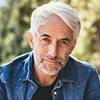 | To learn more about how other men are dealing with this disease, visit Aussie men share their prostate cancer experiences. |
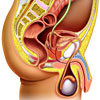 | For more information on prostate cancer, including diagnoses, types of treatments, and some useful tools, videos and animations, see Prostate Cancer. |
Reference
- Prostate Cancer Foundation. Side Effects of Hormone Therapy. Undated. [cited 9 February 2015]. Available from: [URL Link]
Dates
Tags
Created by:

 Login
Login